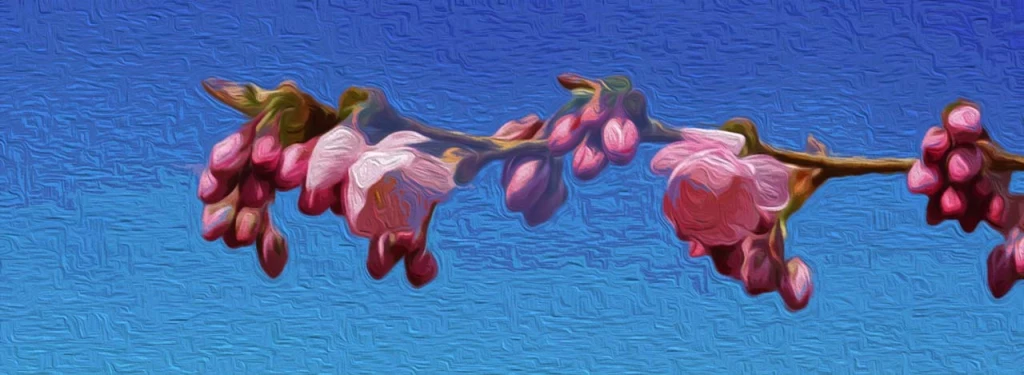One early Spring morning, Du Shenyan and Deputy Lu go for a walk overlooking the Yangtze. The place, Changzhou, near Nanjing, and the East China Sea. Du is awed by the rose colored clouds as they rise from the sea. Taken in by the beauty of the Wild Plum’s pink blossoms and the long yellow catkins on the River Willow. Stunned as the sunlight magically turns the apple tree green. When Lu sings an old song, Du’s thoughts return home.
和晋陵陆丞早春游望
独 有 宦 遊 人 ,偏 惊 物 候 新
云 霞 出 海 曙 ,梅 柳 渡 江 春
淑 气 催 黄 鸟 ,晴 光 转 绿 苹
忽 闻 歌 古 调 , 归 思 欲 霑 巾杜審言
On an early spring walk, harmonizing with Deputy Lu at Changzhou (Jinling)
Only to traveling officials comes the shock of new beauty,
Of rose colored clouds at dawn that arise from the sea ,
Of the Plum and Willow in Spring, pink and white, crossing the Yangtze,
Of a warm breeze that hastens an oriole’s flight,
Of sunlight that turns an apple tree green.
Suddenly hearing you sing an Old Song,
I’m thinking of home, eyes full of tears.Du Shenyan, ca. 645–708
Notes on Translation
Du Shenyan was a politician during the reign of the Empress Zu Wetian, and grandfather to the poet Du Fu. Since Du Fu refers to Luoyang as home, we may assume that Du Shenyan was also from this area in China’s central plain.
This single poem of Du Shenyan was included in the Anthology of 300 Tang Poems.
In the title, Jinling, 晋陵 refers to Nanjing, capital of the Jin dynasty. Why most translators substitute Changzhou, which is further down river, is a mystery to me. Changzhou, near Nanjing and old Suzhou.
Piān jīng, 偏 惊 traveling to a new place, particularly a warmer climate, causes one to marvel at Nature’s vitality. I am not sure if “shock” is the best choice, “awe” and “wonder” work well too.
Jiang, 江 would be understood by all Chinese reading this poem to mean the Yangtze River. It divides the cold north and temperate south. The term Jiangnan (not used) refers to lands and cities south of the Yangtze, including Changzhou and Jinling. Spring came here earlier than China’s central plain, from which Du Shenyan came.
Shūqì, 淑 气, a gentle warm breeze. Qì, 气 is often translated as vital energy or force, a concept in traditional Chinese medicine.
Huáng niǎo, 黄 鸟, literally yellow bird, the “oriole,” the harbinger of spring.
Pinyin
Hé jìnlíng lù chéng zǎochūn yóu wàng
Dú yǒu huànyóu rén , piān jīng wùhòu xīn
Yúnxiá chū hǎishǔ , méi liǔ dù jiāng chūn
Shūqì cuī huáng niǎo , qíngguāng zhuǎn lǜ píng
Hū wén gē gǔ diào , guī sī yù zhān jīnDu Shenyan












